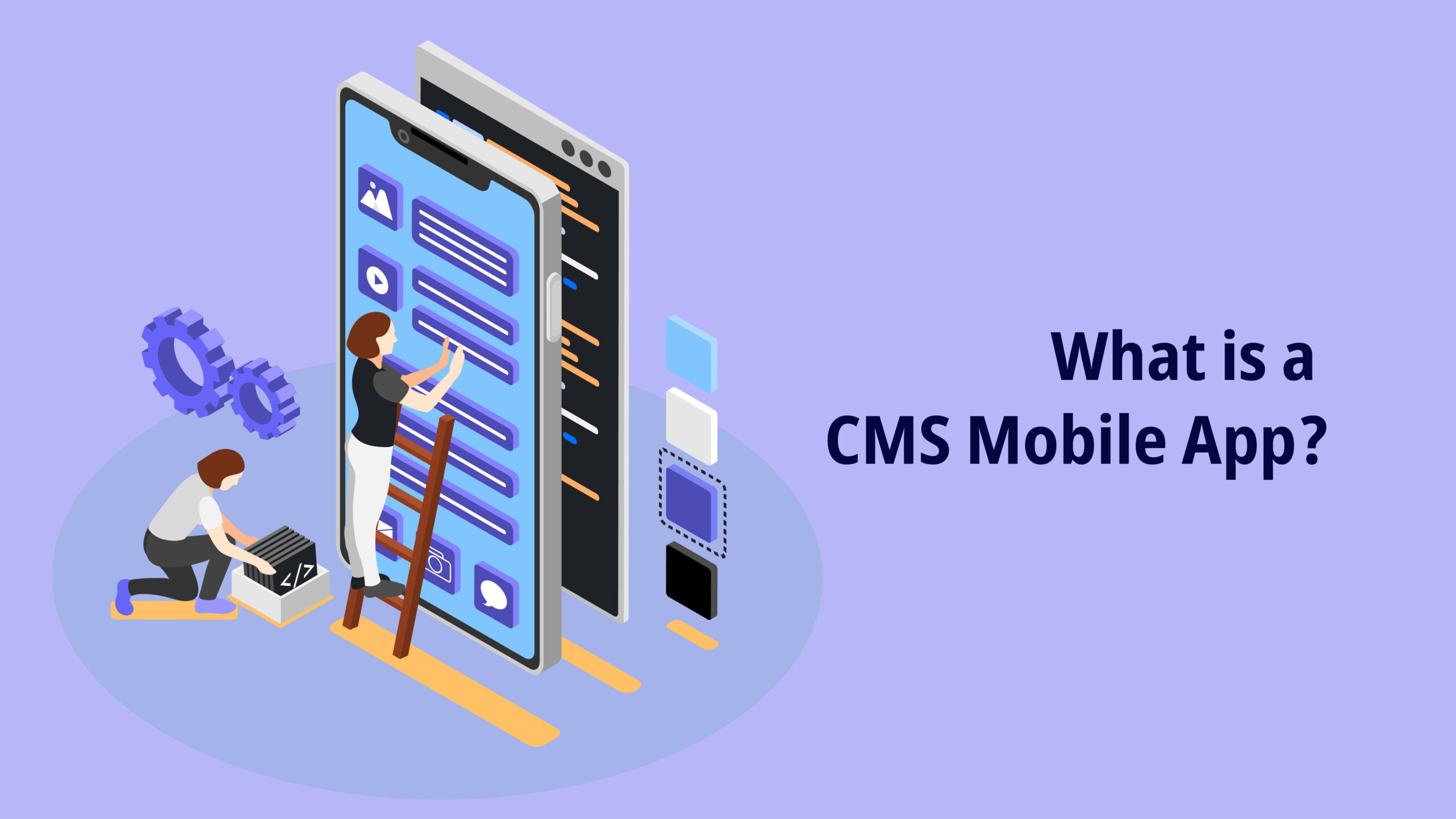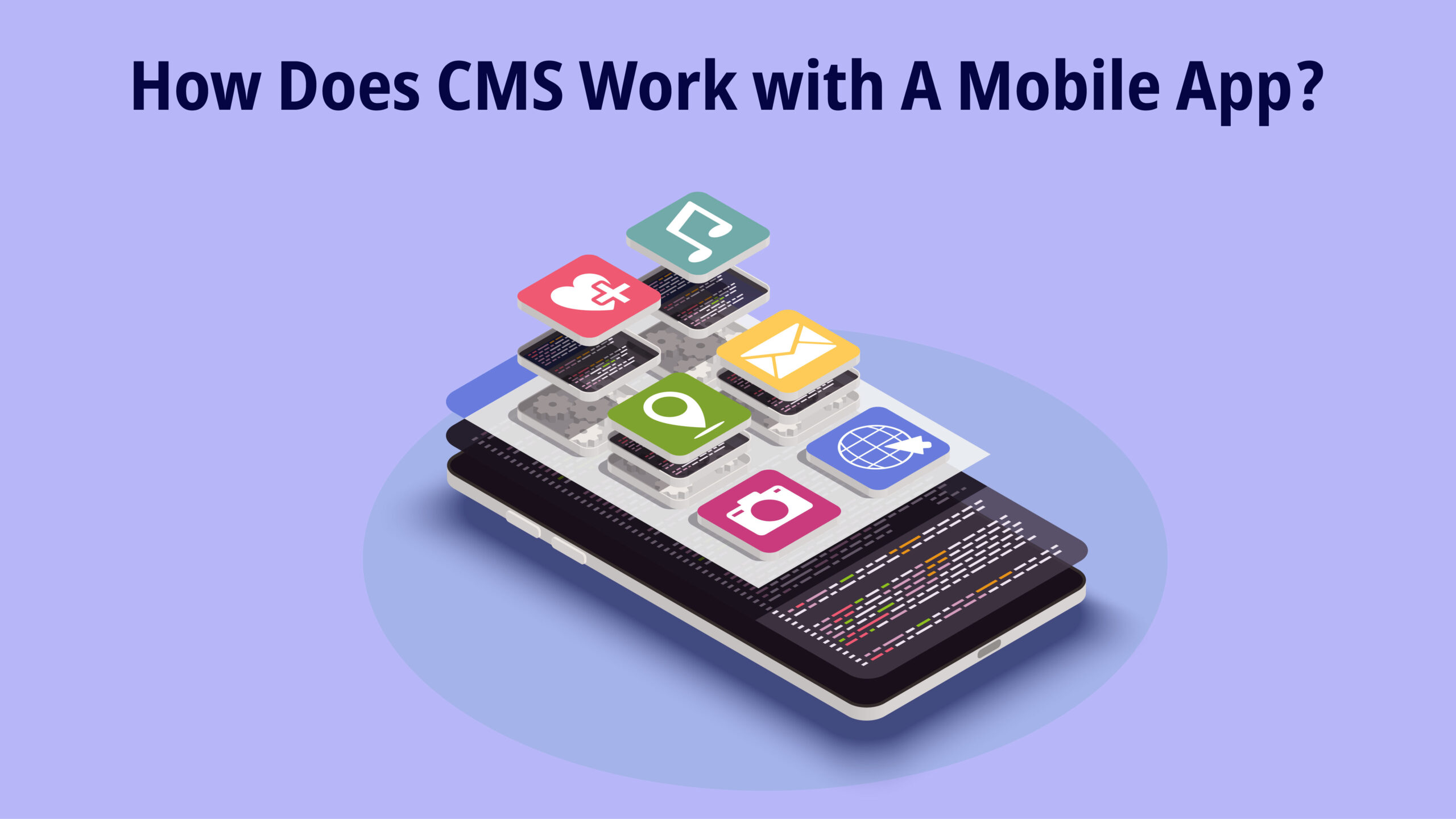As of 2024, the mobile app industry stands as one of the fastest-growing sectors. According to a report by Statista, projections indicate that the mobile app industry generated $935 billion in 2023. With 6.7 million smartphone users globally and mobile devices contributing to 58.33% of web traffic, the smartphone market has experienced exponential growth. To effectively reach the expanding mobile audience, it’s crucial not only to develop aesthetically pleasing and functional mobile apps but also to employ a CMS mobile app capable of building and managing apps across iOS, Android, and other popular platforms. Let’s break down everything about CMS (content management system) mobile apps in this comprehensive guide.
What is a CMS Mobile App?
 A CMS mobile app, also referred to as a mobile content management system, is a platform or software designed for businesses to create, manage, and deliver content tailored specifically to mobile applications. This technology enables the efficient handling of content and services delivered to mobile devices, ensuring a smooth and seamless user experience.
A CMS mobile app, also referred to as a mobile content management system, is a platform or software designed for businesses to create, manage, and deliver content tailored specifically to mobile applications. This technology enables the efficient handling of content and services delivered to mobile devices, ensuring a smooth and seamless user experience.
Several types of CMS mobile apps are available, each with its unique approach and capabilities:
- App as a Mobile CMS: Content is directly coded into the mobile application. It is suitable for simple or static apps but may impact the performance of larger apps or those with frequently changing content.
- mBaaS as a Mobile CMS: Mobile Backend-as-a-Service (mBaaS) allows apps to fetch content and assets from a backend-only database. While flexible, it may lack some content management features found in a comprehensive CMS for mobile apps.
- API-first Mobile CMS: Data is stored in an online database and exposed through API endpoints. The mobile app can make API calls to fetch specific content items or query data collections. It offers flexibility and extensibility through HTTP calls for integration with various platforms.
- Headless Mobile CMS: A Headless CMS decouples the back end (content management) from the front end (presentation layer). It provides developers with autonomy over how content is treated on the client side, offering flexibility in delivering content to mobile apps.
Implementing a mobile CMS app brings several advantages, including streamlined content management, enhanced user experience, and the ability to deliver personalized and engaging content. However, businesses should consider factors such as data security, ethical considerations, cost, and expertise required for successful implementation.
Also Read: Beginner’s Guide to Dark Mode Email: Navigating the Shadows
What Points Should Be Integrated into Your CMS Mobile App?
When considering a CMS mobile app, several key characteristics and features are crucial:
- Built-in Editor: A mobile CMS should include a built-in editor or frontend presentation layer equipped with tools to manage, publish, and make design and layout amendments to the mobile app.
- Previewing Capabilities: The CMS should offer previewing capabilities for various display sizes, including tablets and smartphones. This allows marketers to preview content appearance before publishing. Some editors also facilitate real-time changes to static screens without re-submitting the app, speeding up processes like A/B testing.
- Mobile Friendliness: Opt for an inherently mobile-friendly CMS, emphasizing a mobile-first approach. This ensures that the platform is designed with mobile devices in mind, offering better web content modeling and allowing marketers to shift from website-centric thinking to a focus on mobile devices.
How Does CMS Work with A Mobile App?
 A CMS for mobile apps is a platform or software designed to empower businesses in creating, managing, and delivering content tailored for mobile applications. The process of how a CMS interacts with a mobile app typically involves the following steps:
A CMS for mobile apps is a platform or software designed to empower businesses in creating, managing, and delivering content tailored for mobile applications. The process of how a CMS interacts with a mobile app typically involves the following steps:
- Content Creation and Management: A CMS mobile app facilitates the creation and management of diverse content types, including text, images, videos, and documents. Users can easily create, edit, and organize content through a user-friendly interface or backend system.
- Content Storage: Content is stored within the CMS in a database or cloud storage, ensuring accessibility for the mobile app. This setup allows the app to fetch the latest content updates and deliver them to users.
- API Integration: CMSs often leverage APIs (Application Programming Interfaces) to establish connections with mobile apps. APIs enable the app to retrieve dynamic and up-to-date content by calling specific endpoints exposed by the CMS.
- Content Delivery: When a user interacts with the mobile app, it fetches relevant content from the CMS through API calls. The app then presents the content to the user based on its design and layout.
- Preview and Editing: Many CMS mobile apps offer built-in editors or frontend presentation layers, allowing content creators and marketers to preview and make changes to content before publishing. This ensures that content appears as intended on various display sizes and devices.
- Headless CMS Approach: Some CMSs adopt a headless approach, decoupling the backend (content management) from the front end (presentation layer). This provides developers with greater flexibility in how content is treated and presented on the mobile app.
By utilizing a CMS for mobile apps, businesses can efficiently manage and update content, guaranteeing a seamless user experience. The CMS fosters collaborative content creation, enables content previewing, and provides personalized and engaging content to mobile app users. It’s important to note that the specific functionalities and features may vary based on the chosen CMS platform or software.
Final Words
A CMS mobile app is a powerful tool that empowers businesses to efficiently manage and deliver content to their mobile app users. By utilizing a CMS, businesses can create, edit, and organize various types of content, ensuring that their app stays dynamic and up-to-date. In the ever-evolving world of mobile apps, a CMS is an invaluable tool that helps businesses stay competitive and deliver a superior user experience. By leveraging the capabilities of a CMS, businesses can harness the power of content to engage and retain their mobile app users, ultimately driving growth and success.


Comments are closed.